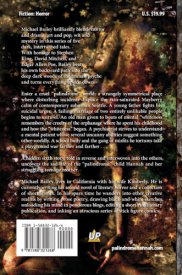direstraits
Well-Known Member
How many of us here look out for things like a book's theme, uncover any symbolisms used and its underlying messages? Do you deconstruct the book in your mind, and marvel at how the book was formed and how carefully it is layered?
Or do we pick up a book, read from cover to cover, shelf it, mull about it a bit, then move on to the next thing?
There are books where you cannot do extended analysis, because it's too simple, but what about for 'loaded' books, that is packed full of themes and messages that it looks like it's gonna break at the seams.
In other words, so we do think about the material we read until we get a CliffNotes version of the book?
ds
Or do we pick up a book, read from cover to cover, shelf it, mull about it a bit, then move on to the next thing?
There are books where you cannot do extended analysis, because it's too simple, but what about for 'loaded' books, that is packed full of themes and messages that it looks like it's gonna break at the seams.
In other words, so we do think about the material we read until we get a CliffNotes version of the book?
ds




